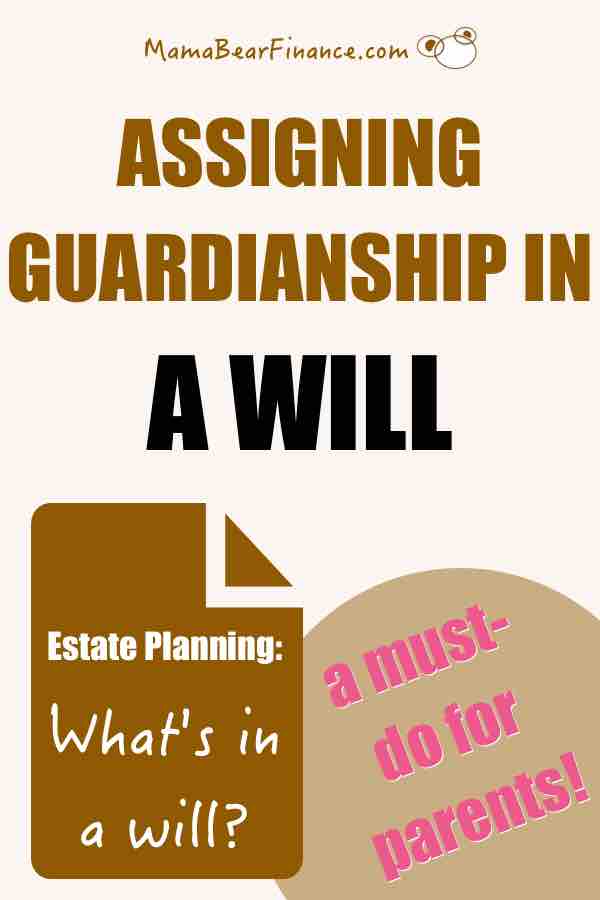Writing a will is an important part of estate planning for parents. Even though the process wasn’t a fun one for me, I knew it has to be done.
Without a will in place, our assets might not be transferred to the right people and our children (under 18) without an assigned guardian.
In fact, guardianship is probably THE most important aspect about writing a will. As a parent, you want to be sure that your child will be taken care of by those you trust. Therefore, any parent with a minor child should write a will.
And since writing a will is so crucial, what should it contain?
Today, I will share the main components of my actual will. Hopefully this could give you some idea about what a will contains as you go through your own estate planning process.
Important Note: Estate planning can be simple or complex depending on your personal situation. This post is meant for informational purposes and shall not be construed as professional advice (see my disclaimer). Please seek legal counsel for individual guidance.

This post may contain affiliate links, which means I may receive a commission, at no extra cost to you, if you make a purchase through a link. Please see my full disclosure for further information.
What Should a Will Contain?
Firstly, a will is a legal document. You can either write one yourself, use an online legal template or hire a lawyer.
Since I do not have a complex mix of asset holdings, and I do not feel like writing it on my own, I decided to use an online legal template. However, in the future I may decide to meet with an estate lawyer to review it.
The only requirement for a will to be legal is that you must be an adult and in “sound mind” when drafting it. And to finalize a will, it must be signed by you as well as two other witnesses.
While a will is generally not needed to be notarized, some states may require you to provide a “self-proving affidavit,” which is a document you could decide to notarize. For more details, check with your state law regarding wills.
As for the content, here are 5 prominent sections from my will:
Declarations with Personal Information
The first section of the will are the declarations which include personal information.
Here you will state your name, where you live, your marital status, your spouse’s name (if applicable), your children’s name and a declaration that this is in fact your last will and testament or pour-over will.
A last will and testament is just that, your final version of the will. Here you may also want to state that any pervious versions before this become void.
On the other hand, a pour-over will is designed to work with a revocable living trust. The latter is made for those who have assets that they want to hold in a trust so that these assets don’t get passed through the probate process.
Gifts at Death
Here is where you will assign the gifts you want to leave to your loved ones upon death.
You would list here the real estates, cars, and sentimental items you own as well as who will take control of them.
Here is also where I listed this Mama Bear Finance blog to be passed on to my daughter. Even though this may just be a website, it can actually be considered as intellectual property which is a form of asset.
If you have a revocable living trust set up, you can declare that the gifts upon death will be distributed according to your trust.
Executor Provisions
An executor is someone who will carry out the instructions in your will.
This person should be a trusted member whom you can rely on to help you upon *sad face* death.
Here you can also nominate a back-up should your main executor is “unable or unwilling to serve or continue to serve.”
An executor plays an important role in sorting out the wishes in your will. Some of the wishes like funeral arrangement is not guaranteed to be carried out as instructed. But if you’ve chosen someone you trust, you can rest assure that this person will follow the instructions.
Be sure to talk to your executor(s) to inform them about your nomination in your will.
Guardianship Provisions
Guardianship is probably the most important section in your will if you’re a parent of a minor.
In this section, you will specifically assign who will be the guardian of your child should you pass away.
This was really difficult for me to write as I just couldn’t imagine leaving my baby behind. But, it was a critical exercise to go through as my husband and I discussed our guardian assignment.
It’s important to note that if you have a spouse/partner, you should each individually write your own will and make sure that the guardian assignment (as well as any shared asset allocation) matches.
Additionally, if you got pets, this would also be the place to name a guardian.
Other Provisions
The reason most parents write a will is to assign guardianship and distribute assets.
However, in your will, you can also list out your other wishes that you deemed are important to you.
This may include the instructions for your funeral arrangement or your pledge to donate to the charities of your choosing.
Again, choosing the right executor will ensure that your wishes will be carried out according to your plans.
Estate Planning Is Important For Any Parent
The main reason I want to share this post is to help other parents who are not aware about estate planning.
Some people mistakenly thought that a will is only reserved for the rich or wealthy, but that’s just simply not true.
If you have a minor child, it’s a good idea to write a will that details whom you want the guardian to be shall you pass away.
This is something you could do without hiring an expensive lawyer. Just be sure to sign it in the presence of two witnesses as well as follow any requirements mandated by your state law.
However, if you do hold real estate or a portfolio of substantial asset holdings, it may be wise to create a revocable living trust.
And whether you decide to DIY your own will, use an online form or hire an estate lawyer, you should keep the original copy of your will in a safe place and notify your executors where it’s stored.
You could also give them a copy of your will, but just be sure to notify them whenever you decide to update or modify it.
Hopefully this article has given you some insights on what’s contained in a will. Until next time!
Related: Revocable Living Trust: Who Needs It?
Have you written your will yet? What was your experience like when drafting your will? What other provisions do you think should be included?

A will to PIN

